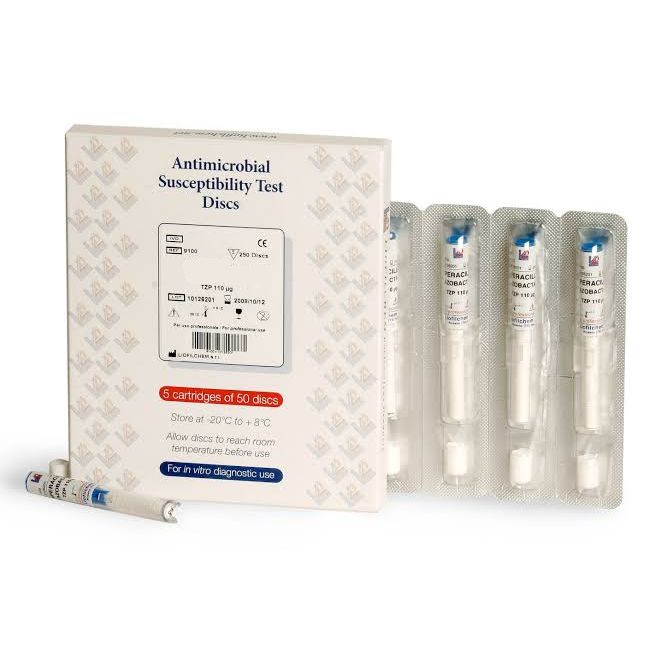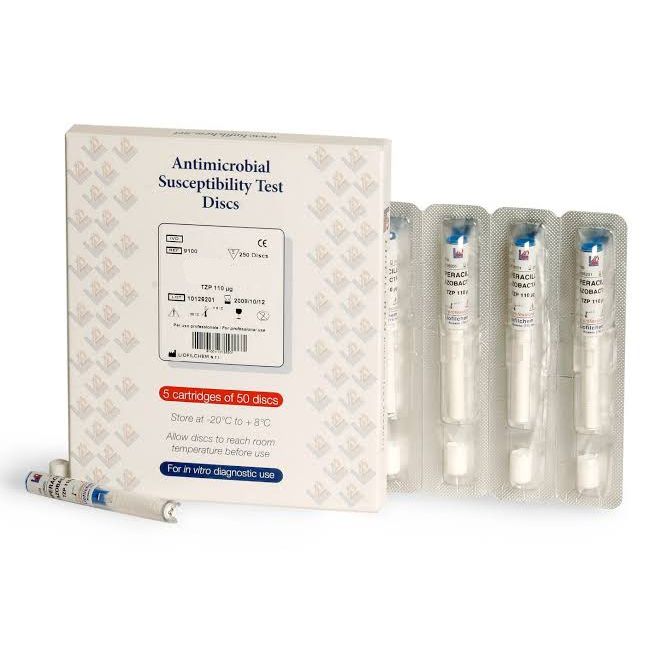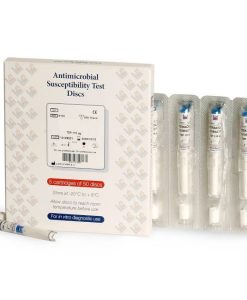Ceftriaxone – 30 μg Antibiotic Disc – Bioanalyse
৳ 350৳ 380 (-8%)
In stock
Brand: Bioanalyse
Origin: Turkey
Use: Vitro Diagnostic Use Only
Number Of Disk: 50
Frequently Bought Together
-
Add to Package (৳ 350
৳ 380(-8%)) -
Add to Package (৳ 350
৳ 450) -
Total Price: ৳ 700
- This item: Ceftriaxone – 30 μg Antibiotic Disc – Bioanalyse(৳ 350
৳ 380(-8%)) - Ciprofloxacin – 5 μg Antibiotic Disc – Bioanalyse(৳ 350
৳ 450)
Ceftriaxone – 30 μg Antibiotic Disc – Bioanalyse
The Ceftriaxone – 30 μg Antibiotic Disc – Bioanalyse is a paper disc impregnated with 30 micrograms of ceftriaxone, a third-generation cephalosporin antibiotic. It is used in the disc diffusion method of antimicrobial susceptibility testing to determine the susceptibility of bacteria to ceftriaxone.
The disc diffusion method is a simple and inexpensive method for testing the susceptibility of bacteria to antibiotics. It is based on the principle that bacteria that are susceptible to an antibiotic will not be able to grow near the disc containing the antibiotic.
To perform the disc diffusion test, a bacterial suspension is spread on the surface of an agar plate. Antibiotic discs are then placed on the surface of the agar plate. The plates are incubated for 16-24 hours, and then the zones of inhibition around the discs are measured. The size of the zone of inhibition is proportional to the susceptibility of the bacteria to the antibiotic.
The Ceftriaxone – 30 μg Antibiotic Disc – Bioanalyse is a valuable tool for the diagnosis and treatment of bacterial infections. It can be used to identify bacteria that are susceptible to ceftriaxone, and to determine the optimal dose of ceftriaxone to use for treatment.
How to use the Ceftriaxone – 30 μg Antibiotic Disc – Bioanalyse:
- Prepare a bacterial suspension by inoculating a loopful of bacteria into a tube of broth.
- Incubate the broth tube at 37 degrees Celsius for 2-4 hours, or until the bacteria are in the logarithmic phase of growth.
- Dilute the bacterial suspension to a turbidity of 0.5 McFarland standard.
- Spread the bacterial suspension on the surface of an agar plate.
- Place the Ceftriaxone – 30 μg Antibiotic Disc on the surface of the agar plate.
- Incubate the plate at 37 degrees Celsius for 16-24 hours.
- Measure the diameter of the zone of inhibition around the disc.
- Interpret the results using the clinical breakpoints for ceftriaxone.
Interpretation of results:
| Zone of inhibition | Interpretation | |—|—|—| | ≥ 37 mm | Susceptible | | 31-36 mm | Intermediate | | < 31 mm | Resistant |
It is important to note that the disc diffusion method is only a semi-quantitative method for testing the susceptibility of bacteria to antibiotics. For more accurate results, other methods such as broth microdilution or agar dilution should be used.
The Ceftriaxone – 30 μg Antibiotic Disc – Bioanalyse is a valuable tool for the diagnosis and treatment of a wide range of bacterial infections, including:
- Community-acquired pneumonia
- Meningitis
- Sepsis
- Skin and soft tissue infections
- Gonorrhea
- Pelvic inflammatory disease
- Lyme disease
- Typhoid fever
Limitations of the Ceftriaxone – 30 μg Antibiotic Disc – Bioanalyse:
- The disc diffusion method is only a semi-quantitative method for testing the susceptibility of bacteria to antibiotics. For more accurate results, other methods such as broth microdilution or agar dilution should be used.
- The disc diffusion method is not able to detect all bacteria that are resistant to ceftriaxone. For example, some strains of Enterobacteriaceae and Pseudomonas aeruginosa are resistant to ceftriaxone, but they may not produce a zone of inhibition around a ceftriaxone disc.
- The disc diffusion method can be affected by the type of agar plate used, the incubation temperature, and the inoculum density. Therefore, it is important to follow standardized procedures when performing the disc diffusion test.
Additional information about ceftriaxone:
Ceftriaxone is a third-generation cephalosporin antibiotic. It is a broad-spectrum antibiotic, which means that it is effective against a wide range of bacteria, including Gram-positive and Gram-negative bacteria. Ceftriaxone is generally well-tolerated, but it can cause side effects such as nausea, vomiting, diarrhea, and rash. In rare cases, ceftriaxone can cause serious side effects such as seizures and anaphylaxis.
Ceftriaxone is a valuable antibiotic that can be used to treat a wide range of bacterial infections. However, it is important to be aware of the potential side effects of ceftriaxone before using it.

Buy Best Biochemistry Analyzer From Medistore



